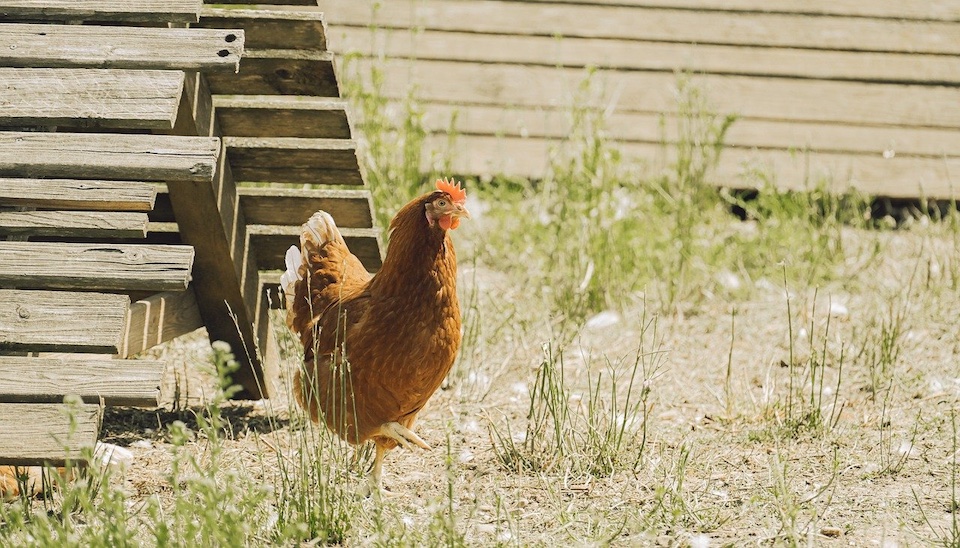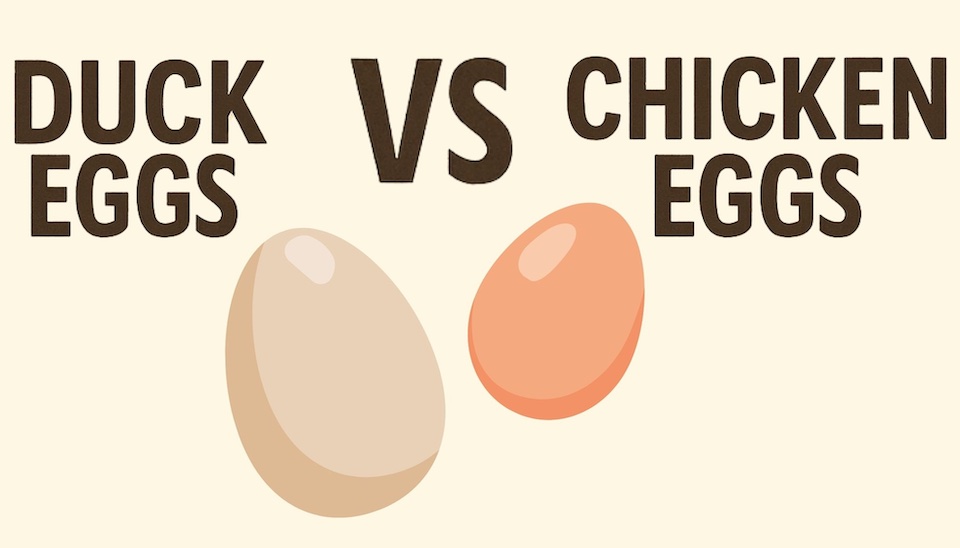Weird Eggs Explained
Chicken Egg Problems - What's Gone Wrong?
When you go out to collect the eggs and find something odd, it's no reason to worry. Although sometimes weird eggs indicate health problems, often a strange chicken egg is just a reproductive glitch. It is completely normal to get strange eggs every now and then – chickens lay tiny eggs, misshapen ones, even shell-less eggs!
But what causes weird eggs? And when should you be worried?
Key Takeaways
- Normality of Odd Eggs: Strange eggs are often the result of normal reproductive glitches in hens. Occasional odd eggs are typical, especially when hens start or finish their laying cycle.
- Common Causes: Weird eggs can be caused by hormonal imbalances, reproductive system glitches, stress, dietary deficiencies, and certain diseases.
- When to Worry: Frequent occurrences of weird eggs, particularly from multiple birds, warrant veterinary attention. Look for signs such as changes in egg color, watery whites, or shell-less eggs.
- Types of Weird Eggs: Common types of weird eggs include thin, cracked or rough shells, discoloured egg yolks, spots in the yolk or white, and tiny eggs.
- Eating Guidelines: While most strange eggs are safe to eat, avoid consuming cracked, shell-less, or diseased eggs.
- Encouraging Healthy Laying: Maintaining a healthy flock, ensuring proper nutrition and monitoring stress levels can help prevent your flock from producing weird eggs.
Common Causes of Weird Eggs in Chickens
Weird eggs are most common when chickens are just beginning to lay or when they are finishing their reproductive life, because the hormones that regulate egg production are changing.
Weird chicken eggs aren’t something to worry about unless they happen a lot. Or, if your whole flock is laying weird eggs. Or if there is a sudden change to egg production.
Some causes of chickens laying weird eggs include:
- Hormonal imbalance
- Reproductive “glitches” in the oviduct
- A disruption to the egg-laying cycle – stress, fright, or even another chicken using the nesting box at the same time can disrupt the laying cycle
- Vitamin or mineral deficiency
- Disease
- Genetics
Most strange chicken eggs are fine to eat. But don't eat eggs that are cracked, exposed to the air, or contaminated with foreign matter.
Diseases That Cause Weird Eggs
Unfortunately, some types of weird eggs are symptoms of chicken illnesses, including infectious bronchitis, Newcastle disease, egg drop syndrome and infection of the oviduct.
The symptoms to look our for include:
- Sudden change of egg colour, in particular white blotches on brown egg shells
- Watery egg whites
- Pointy eggs with wrinkled tips
- Shell-less eggs
Where these things happen a one-off occurrence, you don't need to worry about them. But if you are seeing these types of eggs regularly or from multiple birds, seek veterinary advice and refrain from eating the strange eggs.
Types of weird eggs
So what are weird eggs and when should you be worried? This article goes through a range of weird eggs. Click the list below to jump to the problem eggs you are looking for.
Common egg problems in chickens and their causes:
3. Weird Egg Whites, including foreign objects
Egg shell problems
Thin-shelled eggs
Thin-shelled chicken eggs have thin, brittle shells. They may easily break or crack in the nesting box, but are fine to eat as long as they haven't done so.
Thin-shelled eggs are usually caused by a calcium deficiency, although magnesium and Vitamin D can also affect calcium levels in hens. Both Shell Grit and a Calcium Supplement with Vitamin D are recommended for hens laying thin-shelled eggs.
Thin-shelled eggs can also occur as a result of heat stress or a disruption to the laying cycle. In old laying hens, thin-shelled eggs are the natural result of a long life of egg laying, although supplementation is still recommended.
Shell-less eggs (soft-shelled eggs)
There are 3 types of shell-less eggs:
- Shell-less eggs where the egg yolk and white are contained in a soft sac, which can be transparent or whitish. The sac is actually the egg membrane that usually lines the shell.
- Soft-shelled eggs, where the shell is soft, not brittle, and may rub off.
- An egg completely without shell or membrane (very uncommon)
Shell-less eggs can be caused by a reproductive system where yolks are released too quickly for shells to form properly. This can occur in young hens that begin laying early, and should stop as the hen's hormones stabilise.
Soft-shelled eggs are usually related to diet problems but can be caused by an infection in the reproductive tract, mouldy feed and illnesses including Newcastle disease, infection bronchitis and egg drop syndrome. If shell-less or soft-shelled eggs occur regularly in your flock, seek veterinary advice.
Soft-shelled and shell-less eggs usually break in the nesting box, but they can break inside the chicken. If the latter occurs, it can cause death, so check your flock carefully if you find a broken soft-shelled or shell-less egg.
Shell-less eggs should not be eaten.
Cracked eggs
Cracked egg shells usually occur as a result of thin shells (see above). However, if you get a lot of cracked eggs with normal, strong shells, it can be indicative of one of several problems:
- More padding is needed in the nesting boxes
- More nesting boxes are needed because chickens are fighting over them or trying to use them at the same time
- You have a chicken that is an egg-eater or want-to-be egg eater
- Your chickens are roosting in the nesting boxes
Addressing your nesting box issues, using a Roll-Away Nesting Box and collecting the eggs more often should prevent cracked shells.
Harmful bacteria, including salmonella, can enter eggs through cracked shells. That is why it is recommended that you don't eat cracked chicken eggs.
Pimply eggs (rough-shelled eggs)
The most common rough-shelled eggs are pimply eggs, which have raised, pimply calcium deposits either all over the shell or in one or two spots. These calcium deposits are usually hard, but can also be chalky. Other types of rough-shelled eggs include crinkly egg shells and really uneven shells. As long as they are sealed and not caused by disease, these eggs are fine for eating.
Pimply calcium deposits can be caused by too much calcium in the diet, which is why shell grit should always be offered free-access. However, a delay in laying an egg, for example if the nesting box is occupied, can also result in calcium deposits. Again, it is important to monitor whether this is a one-off occurrence (likely a delay to laying) or regular (perhaps too much calcium).
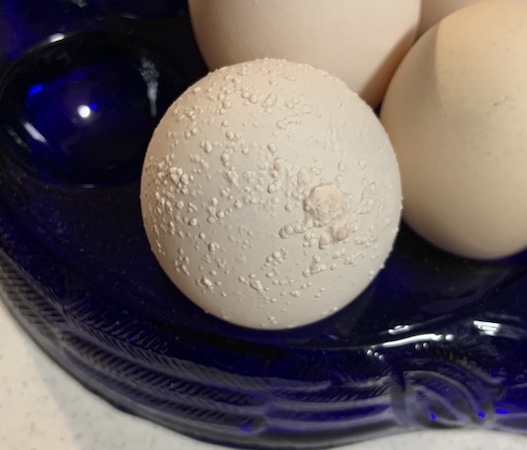
Crinkly or distorted egg shells can be caused by Newcastle disease, infectious bronchitis or, more rarely, genetics. Sandpapery shells can also indicate infectious bronchitis.
Misshapen eggs
Misshapen eggs are most often very elongated, but dented or flat-sided eggs also occur.
Elongated eggs usually occur when a chicken is laying a very large egg, and it is subjected to pressure as it passes through the oviduct. They are more common in older birds, as egg size increases with age. Where elongated eggs occur a lot, and particularly in younger flocks, they may be caused by Newcastle disease, infectious bronchitis or egg drop syndrome.
Dented or flat-sided eggs are indicative of two eggs being in the shell gland at the same time. This is usually related to stress.
Misshapen eggs with a normal shell are fine to eat.
Eggs with a wrinkly tip
Sometimes eggs have a wrinkly tip.
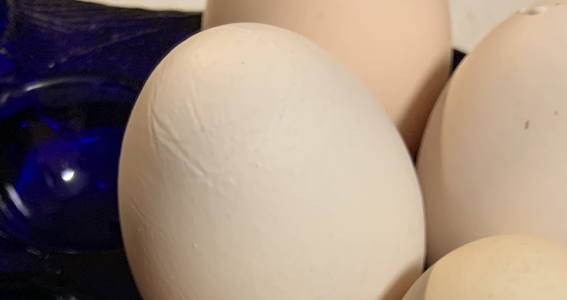
A wrinkly tip on an otherwise normal egg is often caused by the egg remaining in the oviduct too long. This can be due to stress, or a delay laying the egg, such as when the nesting box is occupied.
However, a very pointy egg with a wrinkly, discoloured tip often indicates Newcastle disease.
Eggs with a ridge around the middle
Eggs with a ridge running around the middle can be quite common in older hens. They indicate that the egg shell broke and was repaired while it was forming.
Sometimes the damage to the egg shell is caused by pressure, particularly with large eggs. Or the crack may be caused by environmental stress.
These eggs are safe to eat and are not indicative of a problem provided the crack is properly sealed.
Dirty eggs
Although it's a bit gross, it is very common to find dirty eggs that have a little poo on them.
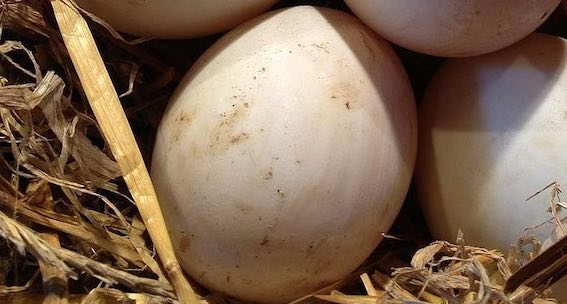
Dirty eggs have various causes:
- Dirty feet - more common in a dirty coop
- Poo in the nesting box - sometimes an accident but often the result of a hen roosting in the nesting box
- A dirty vent - usually caused by dietary problems such as poor diet, worms, poor gut health or disease
Very dirty eggs and chickens with very dirty vents are indicative of a health problem needing investigation and treatment. A little poo on an egg occasionally is not an issue and is very normal.
Washing eggs removes the bloom and allows bacteria to enter, but chicken poo has the potential to carry harmful bacteria including salmonella and E. coli. Therefore, it is best to use dirty eggs as soon as possible and to wash them just before use. Always wash eggs in warm water and never put eggs under a running tap. Learn how to wash eggs safely here.
A Roll Away Nesting Box can help keep eggs cleaner.
Blood-stained egg shells
A little blood on egg shells is not a problem when it only occurs occasionally. It is usually a sign of a little tearing as a hen is laying an egg.
Blood-streaks on egg shells are more common in new layers and small birds, as well as overweight birds. They are usually the result of a particularly large egg but can also occur if a hen is hurried, for example by a flock mate trying to get into the nesting box.
A very bloody egg can indicate an injury or health problem, including a prolapse. Regularly bloody eggs, particularly from multiple birds, can indicate vent pecking or cannibalism.
A chicken egg with a little blood on the shell is fine for cooking. It is best to use the egg soon after collection, and to wash the shell just before use as detailed here.
Pale egg shells and shell discolouration
Egg shells come in many colours, including white. There are also natural variations in egg shell colour within a flock. But an abrupt change in shell colour, including splotches, or pale eggs from a dark-shelled breed, can indicate a problem.
Worms and stress can cause pale egg shells, as can infectious bronchitis and Newcastle disease.
A pale egg where the light colour can be rubbed off with a wet finger to reveal normal colouration underneath is called a lilac egg and is caused by a calcium deposit. This may be due to an excess of calcium or a reproductive mistake.
Streaky shell colour in the outer layer, in brown egg breeds, can also be reproductive upset while the bloom was being formed, as it contains a final layer of pigment.
Eggs with a shiny, discoloured pointy end usually indicate an infection in the oviduct.
Other weird egg shells
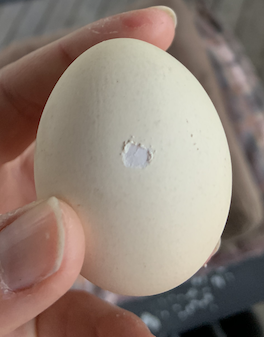
Ultimately, many egg shell deformities are hard to explain. Like the one below, they are often just caused by an upset during egg production or a mistake in the oviduct. But sometimes they come down to calcium - either too much or too little.
Ultimately, as long as the egg is safely sealed, eggs with these types of shell deformities are fine to eat.
Yolk problems
Double yolkers
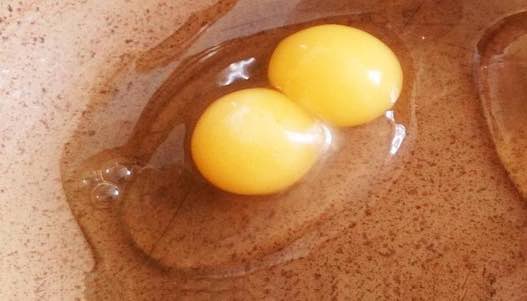
Double yolk eggs are caused when two yolks are released from the oviduct around the same time. They are usually related to a hormone imbalance and are most likely to occur in young layers or older hens.
Double yolked eggs are great for cakes!
Eggs with no yolk
Eggs with no yolk are caused by a glitch in the reproductive system.
A chicken egg is formed when a yolk is released into the oviduct. Releasing the yolk is what stimulates the egg production. An egg without a yolk is caused when the egg-formation process is set off by something else, like hormones or a tiny piece of tissue that the body mistakes for a yolk.
Yolk-less eggs are most common in chickens that are just starting to lay. Unless they happen a lot, over a long period, yolk-less chicken eggs are not a problem. If they look normal (except the missing yolk), they are safe to eat.
Pale egg yolks
Egg yolk colour is largely determined by diet. Bright orange yolks can indicate a diet high in forage greens and nutrients, but yolk colour naturally varies over the course of the year as plants change. Many feeds contain ingredients to make yolks more orange, including corn, marigold and turmeric.
Both of the egg yolks in the photo below are normal. While free-range eggs tend to have brighter yolks due to the forage consumed, a paler egg yolk does not necessarily indicate that hens are not free-ranging, as diet plays a huge role in egg yolk colour.
Pale yolks can be a sign of poor nutrition, but can also be naturally occurring. Very pale, whitish yolks are often a symptom of worms requiring treatment.
Discoloured egg yolks
Occasionally chicken keepers report discoloured egg yolks, ranging from blue and green through to red. Usually this type of discolouration is caused by chickens eating certain plants or something they shouldn't.
Sometimes egg yolks can have a mottled colour, with lighter or darker patches. This is caused when the egg white has seeped into the yolk. It is more common in older hens but can be linked to the use of anti-coccidial medication. Layered egg yolk pigment can be caused by hens only eating 2-3 times per day.
Discoloured egg yolks where the cause is unknown should probably be discarded. Withholding periods for medications should be observed and medicated Chick Starter should not be fed to laying hens.
Blood in chicken eggs
Blood spots in chicken eggs usually occur on the yolk. They can take the form of a spot or smear, or visible blood vessels.
Blood spots on the yolk are usually caused by bleeding when the yolk is released. This can also cause blood in the yolk. Blood spots are more common in older hens.
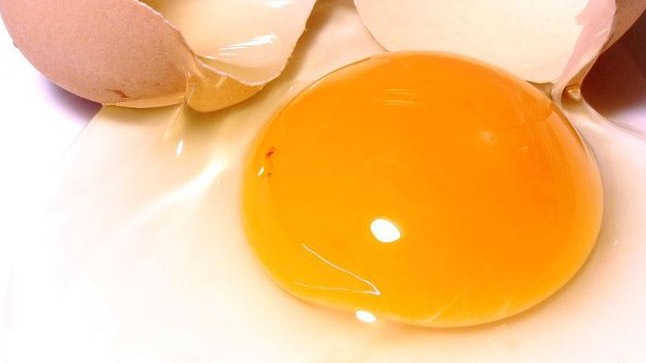
If you are getting lots of eggs with blood inside or a large amount of blood, it may be indicative of a problem. Causes can include Vitamin A or K deficiency, sudden stress, mouldy feed or Avian Encephalomyelitis.
Blood vessels on the yolk of a potentially fertilised egg can indicate that an embryo was beginning to form. This would only occur if fertilised eggs were left in the nesting box for several days or stored at very high temperatures.
Egg white problems
Meat spots in eggs
Meat spots refer to small pieces of material (less than 0.5 cm diameter) floating in the egg. The spots may be red, pink, grey, white or brown. They are usually in the white but can be connected to the yolk.
People often say meat spots indicate a fertilised egg, but this is not true. Meat spots are a piece of reproductive tissue that has been encased in the egg. They are more common in older hens, and small meat spots are quite normal.
Although unappealing, eggs with meat spots are fine to eat. Usually, people just remove the meat spot before cooking.
Worms in chicken eggs
Wormy eggs are not very common. Although all chickens carry parasites, it takes a severe infestation to cause worms to infest the eggs and by that point hens are usually far too unhealthy to lay.
The worms that are found inside chicken eggs appear as a small thread and are usually roundworms. If you discover eggs with worms inside, you should worm your whole flock. Chickens should be wormed at least twice a year.
Watery egg whites
It is normal for old eggs to have watery egg whites. How old the eggs need to be depends on storage. But a fresh egg with a watery egg white can indicate a problem.
Very transparent, watery egg whites that remain glassy after boiling can be caused by disease including infectious bronchitis, Newcastle disease and egg drop syndrome. Watery whites can also have more benign causes, in particular heat stress.
Do not eat eggs with watery whites caused by disease.
Other weird chicken eggs
Tiny eggs (fart eggs)

Tiny chicken eggs, also called fart eggs or fairy eggs, are small eggs. Sometimes they are perfectly formed, but small, but most tiny eggs contain just white or white with some wisps of yolk.
Egg size is largely determined by the yolk, so a small egg is normal when there is no (or little) egg yolk. A tiny egg is usually caused by a tiny yolk, or tissue, stimulating egg production. Tiny eggs with wisps of yolk are normally caused by the yolk breaking before the egg is fully formed.
Tiny eggs are most common in young chickens just beginning to lay, or in hens that are finishing up laying. They aren't normally indicative of problems. You can read more about tiny eggs here.
Eggs inside eggs
Eggs inside eggs are very uncommon. There is a less than 1 in a million chance of one occurring!
Usually an egg within an egg is caused by an upset in the reproductive cycle, usually related to environmental stress. A fully-formed egg is accidentally kept in the oviduct too long, and sucked back up to be included in a newly forming egg.
Preventing weird eggs
While weird eggs are interesting, most chicken keepers would like to avoid them. Keeping your flock healthy and disease-free will prevent any weird eggs that might otherwise occur from illness.
Keep your chickens healthy and laying well with our handy articles:
- How to get bigger eggs from your flock
- Tips to increase laying in older hens
- The best diet for laying hens
- Diagnose and treat egg binding
Happy chicken keeping!
Rachael at Dine a Chook Australia


